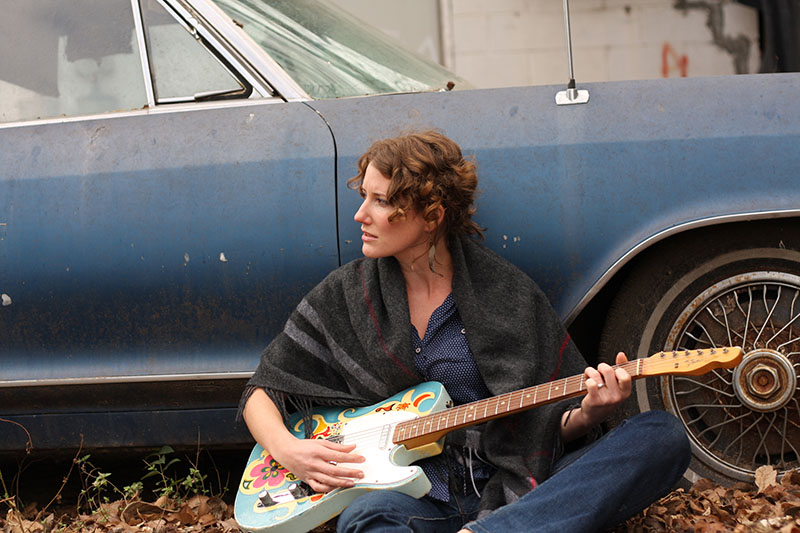
The Lowdown:
January 18, 2012
Kathleen Edwards: Voyageur
by Jason D. 'Diesel' Hamad
Ottawa native Kathleen Edwards may be a redhead (and cuter than Willie), but she's no stranger to the Americana scene. For her latest release, however, she decided to explore some new territory with the guidance of Bon Iver frontman Justin Vernon.
While most Canadian musicians try to blend in with the natives when they come onto the American scene, Kathleen Edwards has always been unabashedly… well, Canadian. Her most well known song, “I Make the Dough, You Get the Glory” (which may just be one of the best of the last decade), not only features a prominent reference to relatively obscure hockey player Marty McSorley, but even mentions a Dodge Sparkle. Now that’s Canadian. Whether or not she’s in “heavy rotation on the CBC (whatever in hell that really means)” these North-of-the-Border idiosyncrasies in her music may take some decoding for an American listener, but make many of her songs all the more appealing.
Even the title of her newest release, Voyageur, is distinctly Canadian. It’s not just some funky Québécois spelling of “voyager,” but has its own distinct definition:
(In Canada) a person who is an expert woodsman, boatman, and guide in remote regions, especially one employed by fur companies to transport supplies to and from their distant stations. –Random House Dictionary, 2012
Quirky Canadianisms aside, Edwards’ previous three albums have all been pretty straightforward, straddling that murky, indefinable line between folk rock and alt.country. With Voyageur, however, she moves well beyond the limits of any genre, expanding her musical form greatly as she does. I can’t believe I’m about to say this, but it’s possible—in fact probable—that a lot of the credit for this has to go to Justin Vernon, who co-produced the album along with Edwards. One has to half-wonder if Vernon is, in fact, the metaphorical voyageur referenced in the title, guiding her into unexplored territory.
Now everyone who reads this site knows that I hate the Bon Iver frontman with a passion. As far as I’m concerned, his music is absolute crap and I don’t understand the current fascination with it. I have often lamented the fact that everyone all of a sudden wants to sound like Bon Iver. In fact, I’m not entirely sure what to think about the fact that Ms. Edwards—after going through a divorce that runs like a river of pain through this album—is dating Vernon. As far as I’m concerned, that’s kind of like Martin Luther King hooking up with J. Edgar Hoover (wearing a dress, of course). I don’t know Mr. Vernon—he may be a great person—and what the two of them do with their private lives is their business. But when it affects their music, I’m going to make it mine. And Edwards’ music has been affected so greatly by the collaboration that it’s almost impossible not to focus on Vernon’s mixed bag of contributions even more than her own.
When I heard the first fruits of their collaboration, a non-album track called “Wapusk” that was leaked on the internet several months ago, I was stunned by how just absolutely boring it was. It was filled with the stupid random noises, too-cute flourishes and jumbled instrumentation that are Vernon’s unfortunate trademarks. If anything, it was closest to shoegaze, but less engaging. I was sure as shit that Vernon had completely ruined an artist who is, at the very least, one of the best vocalists of our time. I’m not saying that Edwards can’t stand up for herself, but it was very obvious that Vernon had sacrificed everything that was at the core of her music in order to turn her into something in line with his vision. I was actually dreading the release of this album.
But eventually something must have clicked. The best songs on Voyageur are obviously influenced by Vernon’s style, but are still undeniably Edwards’ at heart. Gone are the twangy guitar lines of Asking For Flowers, but the more indie-rock style works for her. The sound is expanded just enough to add something to Edwards’ previous style. Yes, there are still a few jarring, pointless, random electronic sounds that detract from the music, but for the majority of the album, it avoids the absurdum ad infinitum “everyone just play at once” credo that makes Bon Iver unmusical. And unlike on that album, where the lyrics and even the vocals are subservient at best to the over-precious music, here Edwards’ crisp, clear wordsmithing is more than an afterthought and her voice sails above the instrumentation… most of the time. This results in several powerful tracks that Edwards never would have attempted in the past.
But what Justin Vernon giveth, Justin Vernon taketh away (now even I’m buying into his god complex), because while several songs really do benefit from his input, several others are completely ruined by his heavy-handedness. When the songs are still recognizable as Kathleen Edwards work, they are very good. When they are nothing more than some chick screaming to be heard over a Bon Iver monstrosity, they are… well, not.
Is that a Dodge Sparkle you’re leaning on, Kathleen, or are you just happy to see me? I’m pretty sure neither is the case, but even so, you can’t escape Edwards’ distinctly Canadian lyrical quirks. For the record, that’s the most girlie NON-pink guitar I’ve ever seen.
Evidence of Edwards’ uniquely Canadian perspective can be found right off the bat in the album’s opener, “Empty Threat,” in which she muses about picking up and crossing that long Southern border. The track starts out with a loud blaring (as if Vernon just couldn’t help himself), but soon settles into a quick-paced acoustic guitar strum that marks a clear path back to Edwards’ earlier sound. From the second she opens her mouth, that distinctive voice is absolutely gorgeous. The woman could sing the Ottawa phonebook and it would be enrapturing. With an expansive sound that includes piano, a driving bass and an intermittently potent electric wail, it’s evident right away that this album is a departure. The multi-layered vocal chorus makes this even more obvious. But it works. In fact, it works so well that it almost seems that Edwards grew up in the Brooklyn indie rock scene. Everything to love about her is present, but it’s just… bigger. Dancing through the high-energy music, Edwards’ lyrics tell of a quest for rejuvenation, an attempt to remake herself:
Over the coast of flowers
My boat flipped under showers.
I hit my head until it bled.
At first we said goddamn it.
I’m movin’ to America.
Movin’ to America.
Movin’ to America.
It’s an empty threat.
In the end she changes her tune and suggests it’s not an empty threat. This may be closer to the truth, as some say she’s not spending most of her time with Vernon in Wisconsin. If that’s true, we’re glad to have you, Kathleen, but I warn you it’s a long drive to find poutine.
At the other end of the bookshelf, the album’s closer, “For the Record,” is a sparse, beautiful piece, and one of the album’s real triumphs. While the drums are prominent and an electric guitar wails throughout, it is the organ that forms the basis for the music. Still, Edwards’ voice seems to stand naked, her emotion cut into each and every intonation:
My blood is thick but it still runs.
Every time I was taught to bite my tongue.
It’s been years and the letters they still come.
Still come.
So hang, hang me up on your cross.
For the record, I only wanted to sing songs.
Hang me out to die in the sun.
For the record, I only wanted to sing songs.
I’ve never actually met Kathleen, but I swear she wrote “Chameleon/Comedian” about me. Really, it’s about somebody who (rather annoyingly) hides behind a never-ending series of jokes. Edwards does not approve:
Everybody’s watching.
The way that I see you could not change.
I’ll be your medium
For everything you wanted to say.
‘Cause out of the shadows,
Out of the cameras and the lights,
I’m a chameleon.
I just hide behind the songs I write.
See me smile.
It’s not for a funny joke.
See me smile.
It’s not for a funny joke.
It’s for…
Every time
Every time
I don’t need a punch line.
I don’t need a punch line.
These slightly anguished vocals are set upon a musical backdrop both full and powerful but not rushed, like Edwards is perfectly content to take her time in explaining herself. It even features some impressive harmonies by Vernon, who for once sings like an actual adult male instead of a pre-pubescent boy, until the end where he completely kills the mood by shrieking “I don’t need it” several times, filling me with an uncontrollable urge to punch him. Still, aside from that it’s a pretty damn good song.
“Mint” is a blazing, bluesy piece filled with electric guitar and thundering bass. It drives along at a slow-step pace, but seems to part waters for the chorus, which is just awesome:
God knows I want to.
God knows I need to.
God doesn’t know you
Like I do.
“Change the Sheets” is probably the most Vernonized song on the album, but also one of the best. The sound is unlike anything Edwards would have attempted before, reminiscent of Death Cab For Cutie’s most recent effort, with pulsing, warping keyboards and an electronic kick that emphasizes her vocals. Still, the music does not overpower her. There’s more than a little bit of breakup vitriol, but also a sense of forward motion in time with the soaring vocals and driving music:
I wanna lie in the cracks of this lonely road.
I can feel it in the plexer every time you don’t fold.
Here is the truth I swear it used to be fun.
Go ahead, run, run, run.
Change this feeling under my feet.
Change the sheets and then change me.
The video (above right) is a mash-up of touring scenes and stark time-lapse images of both urban and rural environments, which only serve to heighten the disconcerting, urgent sense of the music’s fast beat.
But even while this song and several others benefitted from the Vernon treatment, there are others that are just as obviously ruined. “Sidecar” is a rockin’ track that seems like a mix of 80’s Go-Go’s and a Mary Huff song from Southern Culture on the Skids. It’s a new-love song, giddy and expectant, putting it in stark contrast to the rest of the album’s breakup meme. The music is not uncompelling, but it is really Vernon-style overdone. Lyrically it may be a bit of a throwaway. “You and I will be sidecars” is a line with obvious implied meaning, but a sort of literal flaw. I’m not sure Kathleen actually knows what a sidecar is (despite the picture above). One of you has to be the motorcycle and one of you has to be the sidecar for you to get anywhere. If you tie two of them together all you’ve got is a hillbilly loveseat. I’m also pretty sure she repeatedly uses the word “stuff,” which next to “things” is the least-descriptive word in the English language. Doesn’t matter, most of that refrain is drowned out by the music, anyway. I know this song will probably be a hit just because I’m complaining about it.
“Pink Champagne,” the song most directly reflecting the dissolution of Edwards’ marriage, moves along at a glacial pace, not unpleasant except in the fact that Vernon completely destroyed any chance it had at tapping into real emotion. The whole thing is filled with that “see how good I am” filler that swells to a pathos-laden pile of crap, where an empty space would much better convey Kathleen’s misspent passion. Vernon needs to learn what Edwards used to understand: that good music speaks for itself and doesn’t need to be forced.
Vernon’s greatest crime against humanity, however, is to be found in “Going to Hell.” Back to the Canadian thing, this song amounts to a declaration of war as far as I’m concerned. It starts out mellow and introspective, but then speeds as Edwards sings:
When the weather breaks
We can sell the Great Lakes
And make a white flag from a pillow.
Well, missy, I hate to inform you, but we own half of Superior, Ontario and Erie, almost half of Huron, and the entirety of Michigan, and if you think you’re gonna sell ‘em out from under us, you got another thing coming. We fought your Queen-loving asses for ‘em once back in 1813, and as I remember, we beat y’all pretty good. In fact, we built a monument tall enough to see Canada to commemorate the occasion. So if that’s the way it’s gonna be, I’m glad you’re working on that white flag ahead of time.
Still, I love those lines and everything Edwards builds around them. Unfortunately, while the lyrics are ultra-compelling and it could have been a great song, Vernon’s hand was too much on the till. After the first few verses—in which Edwards seems to be channeling fellow Canadian Leslie Feist to great effect—it just jettisons all sense of being a song and breaks into one of those formless mushes that make Bon Iver indistinguishable from a bad case of diarrhea. The first minute and a half almost redeems the effluent that follows, but still, it’s an unfortunate turn and it would have been much better had Edwards allowed it to be what it wanted to be, which was a real song.
Edwards' talent may have been hampered by her own music throughout much of this album, but enough of it shines through to make Voyageur a work worth exploring. And damn, she makes a plain blue wall look good.
I wish I could give points for trying, because a number of the tracks on Voyageur really want to be good. They were just the failed products of an interesting experiment, one that I don’t blame Edwards for trying. Every attempt at something new is going to have mixed results. In some cases—most notably “Empty Threat,” “For the Record” and “Change the Sheets”—the blending turned out spectacularly. In others, there just wasn’t enough of what makes Edwards good left over after Vernon added what makes him… awful.
In the end, the responsibility for the album—both good and bad—lies with Edwards. She sought Vernon out looking to make a change in her sound, she co-produced the album, and she (at least should have) had the final say on what came out of the sessions. Perhaps Voyageur Vernon pushed Edwards into new territory, and the question was whether she was wise enough to call halt when they strayed too far. He was the dreamer; she was the quality control. Whatever the dynamic, this experimentation makes Voyageur at the very least a compelling album, and no amount of overproduction could really overshadow Edwards’ stellar voice and plainspoken lyrics. I just hope next time she’ll take what she’s learned about expanding her sound to a producer who won’t lose everything that’s at the core of her music in an effort at his own self-aggrandizement. In other words, someone who’s not Justin Vernon.
| mp3 | cd | vinyl |
|---|---|---|








